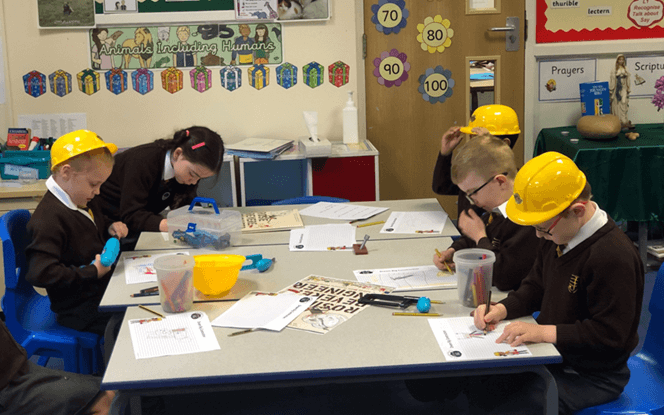Dreaming big with engineering careers
Dream Big was an Ingenious funded project run by the National Literacy Trust, which provided an opportunity for engineers to inspire disadvantaged children aged 5 to 7 years in the Northeast of England to the world of engineering work.
The National Literacy Trust delivered a fully immersive experience in the world of work for children, enabling them to imagine their futures in the engineering sector, as well as improving the communication and engagement skills of engineers.
About Dream Big
Dream Big was created to support the primary literacy curriculum and the development of early intervention for career-related learning. Research shows that children from as young as five have ingrained stereotypical views about the jobs people do based on their gender, ethnicity, and social background. Most children’s career aspirations are based on their own family, friends, and the media, with less than 1% learning about a job from someone visiting their school. Giving children access to a range of role models from the world of work can help to widen their experience of different types of jobs and empower teachers to organise further career-related learning. (Education & Employers, Starting Early: Building the foundations for success).

The children met the engineers online via their classrooms to find out about their jobs and read STEM related books. The books used in the lessons included Rosie Revere Engineer, about a young girl inspiring to be an engineer. To conclude the project activities, the children participated in a Dream Big day, exploring different career roles through free and imaginative role play. As an engineer, the children designed their own inventions and presented them to the class.
The project enabled the children to imagine their futures in this sector, as well as improving the communication and engagement skills of the engineers involved.
Reflections
The schools felt that the programme had benefited the children’s literacy development, while also broadening their horizons and tackling gender stereotypes. The children met the engineers online, primarily due to the restrictions of the COVID-19 pandemic. This worked well, but it would also be beneficial for both the students and engineers to meet the children in person.
Online engineer engagement meant that it was easier to engage engineers, but going forward a mixture of online and in-person engineer engagement methods would work best. This is how we plan to continue to deliver Dream Big.
We also hope to develop the programme offer beyond Key Stage 1, initially to Key Stage 2 children. This will help schools to provide children with encounters with the world of work through their primary education and introduce more complexities to the literacy and career related activities, such as being able to explore the differences and similarities between the jobs in more depth.
It was important that the programme was sustainable for the school. To ensure this was possible, we trained the teachers in best practice for embedding career-related learning, with literacy as the vehicle for learning. In addition, the programme resources remain available to participating schools. This means that the programme has a lasting legacy in the schools that other children can benefit from going forward.
Advice to future Ingenious projects
Our one piece of advice to future ingenious projects would be to actively engage your stakeholders throughout the project design and delivery. Ask the engineers how they will find it most beneficial to engage in the project and utilise their skills and experience fully.
Following on from regular reviews, we recommend providing flexibility for engineer engagement options where possible. Be clear to the other stakeholders (in this case teachers) of the engineers’ role and how best to utilise their time and experience for maximum impact for both thechildren and the engineers they are meeting.
